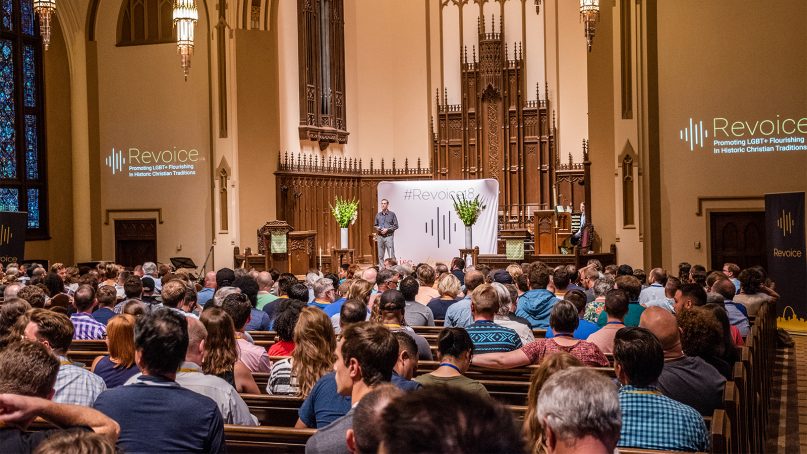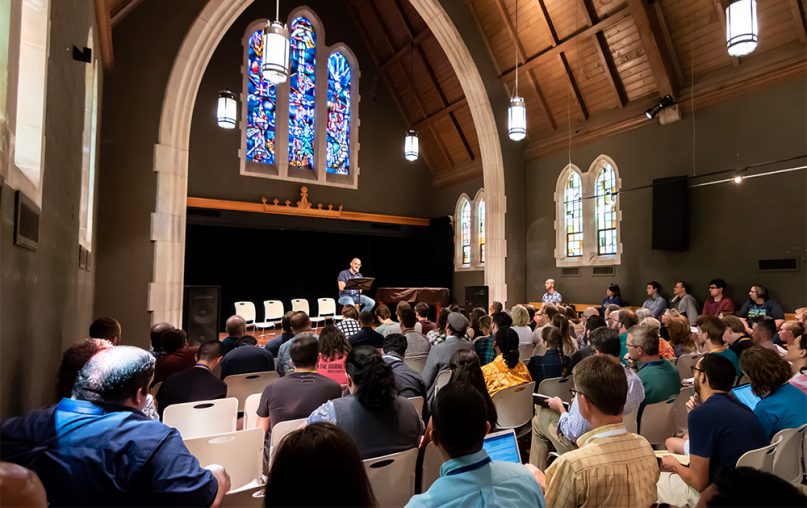(RNS) — Last month, more than 400 LGBTQ Christians gathered in St. Louis to discuss a topic that makes them a pariah in the culture wars: their shared commitment to living celibate lives as a matter of faithfulness.
Over three days, presenters at the first-ever Revoice Conference talked about sexual minorities in the church, how straight people can be allies and intersectionality between race and sexuality, among other topics. According to the website, Revoice aimed at “supporting, encouraging, and empowering gay, lesbian, same-sex-attracted, and other LGBTQ Christians so they can flourish while observing the historic, Christian doctrine of marriage and sexuality.”
That last part — “while observing the historic, Christian doctrine of marriage and sexuality” — puts Revoice in the middle of massive cultural and theological divides that are shaking up Christian communities. Amid greater acceptance of LGBTQ identity and same-sex marriage in the U.S., Revoice hopes to help LGBTQ Christians find a way to flourish while abiding by traditional Christian teaching.
This is a lonely road to walk. On one hand, organizers readily use language of identity common within the broader LGBTQ community. They believe churches have generally done a poor job of serving that community. Many recall with dismay the “ex-gay” movement of the 1980s and ’90s that promoted conversion therapy (the notion that one could, with enough effort and prayer, change one’s sexual orientation) and touted spiritual techniques to “heal” gay attraction. Revoice leaders reject such approaches because they’re prone to do more psychological and spiritual harm than good.
On the other hand, they also believe Christian doctrine forbids sex outside of heterosexual marriage. Many Revoice leaders are celibate or in mixed-orientation marriages (a male-female marriage in which one spouse has same-sex attraction or identifies as LGBTQ). This differentiates Revoice from the Q Christian Fellowship and the Reformation Project, which advance full inclusion and affirmation of LGBTQ sexual relationships and marriage.
Revoice was denounced before even starting, from both sides of the culture wars.

Hundreds of people attend the inaugural Revoice Conference in St. Louis on July 26, 2018. Photo courtesy Nate Collins
From the conservative side, criticisms centered on the language used by Revoice organizers. In essence, critics say “LGBTQ Christian” is an unacceptable label because it foregrounds sin as a personal identifier. To critics, the notion of “orientation” is a modern category that doesn’t accord with biblical teaching on sexuality. Presbyterian pastor Jim Shaw wrote, simply, “One cannot be ‘Gay’ or ‘LGBTQ’ and a Christian” (even though 48 percent of LGB Americans report belonging to a Christian group). Critics also say that, by adopting progressive mainstream labels like “sexual minorities,” Revoice puts Christians on a slippery slope toward full LGBTQ acceptance.
Al Mohler, president of the Southern Baptist Theological Seminary, wrote, “We cannot see Revoice as anything other than a house built upon the sand. Revoice is not the voice of faithful Christianity.”
Yet LGBTQ leaders and pastors in St. Louis also denounced Revoice before it started, calling it “spiritual violence, unhealthy, and unwelcome in our community.” To them, the traditional Christian teaching that prohibits sex with someone of the same gender inflicts shame and self-hatred and is based on a few culturally specific passages of Scripture. “We are not problems needing to be fixed,” said the statement. “We are unique and special, shining examples of the beauty of humanity, and we will not allow that to be taken away from us.”
While Revoice convened mostly Protestants, speakers Eve Tushnet and Ron Belgau are also carving out a space for celibate gay Christians in Roman Catholic communities. Belgau, who runs the Spiritual Friendship website, was the only openly gay person invited to speak at the World Meeting of Families during Pope Francis’ 2015 U.S. visit. The title of Belgau’s talk, “Always Consider the Person,” is a quote from the pope, who is widely seen as offering a more welcoming posture to LGBTQ persons.
“My biggest theme would simply be moving away from the culture wars’ focus on ‘us versus them,’ and saying, respond to people as people,” said Belgau in 2015.
That’s what Revoice is trying to do — even while both the left and the right seem threatened by the approach.

Grant Hartley teaches a workshop entitled “Redeeming Queer Culture: An Adventure” during the Revoice Conference in St. Louis on July 27, 2018. Photo courtesy Nate Collins
Nate Collins, the president of Revoice, told me that the conference was inspired in part by the Nashville Statement. Released last summer by the Council on Biblical Manhood and Womanhood and signed by about 190 leaders, the statement reaffirmed traditional Christian beliefs about gender, marriage and sexuality. Those beliefs include that God designed marriage to be between a man and woman; that God’s will for all people is chastity outside of marriage; that it is sinful to approve of gay behavior; and that transgenderism is not a legitimate identity for Christians.
But to many LGBTQ Christians — even those who uphold traditional views on these matters — Collins said the approach behind the Nashville Statement is “wrongheaded.”
“The NS embodied a posture towards the conversation about gender and sexuality that was pastorally insensitive and missiologically counterproductive,” Collins told me. He noted that the statement’s drafters failed to acknowledge the many ways that Christians have mistreated LGBTQ persons. “I personally view the NS as a form of spiritual abuse.”
In other words, where many conservative Christian leaders denounce LGBTQ identity, many are unwilling to do the relational work of walking alongside same-sex-attracted Christians as they attempt a very difficult thing: lifelong celibacy. The Nashville Statement offered a strong “no” to gay identity and behavior, but didn’t offer a positive vision and vocation, a “yes,” to those Christians beyond the avoidance of certain behavior and labels.
In this way, Revoice puts flesh and blood on what can come across as cold doctrine. It offers a modest “yes” to the universal human need for friendship, authenticity and hope.
As prominent celibate gay Christian Wesley Hill wrote, “It was the first theologically conservative event I’ve attended in which I felt no shame in owning up to my sexual orientation and no hesitation in declaring my sexual abstinence.” That sounds like freedom, and judging from other participants’ response, the conference met its goal of “supporting, encouraging and empowering” celibate LGBTQ Christians.
The second Revoice is scheduled for June 5-8, 2019.
(Katelyn Beaty is former managing editor of Christianity Today and the author of “A Woman’s Place.” The views expressed in this opinion piece do not necessarily reflect those of Religion News Service.)





